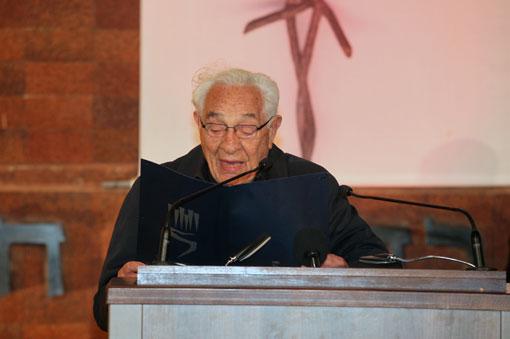In July 1941 the Jews of Kovno were ordered to leave their homes and to move into the ghetto. About a month later the ghetto was sealed and some thirty thousand Jews were crowded inside. Within three months, in a number of aktions, over twelve thousand Jews were murdered in the ghetto.
Many of us were sent for forced labor and the ghetto population shrank, as did the area that had been allocated for the ghetto. Despite all this, we smuggled food into the ghetto, cared for the elderly, disabled, sick and the children, and we began to organize an underground in the ghetto. My brother Abraham and I were both members of the underground. Our aim was to escape from the ghetto, join the partisans in the forests and fight the Germans with them.
But Kovno was far from any partisan bases. We had to go a great distance, through a hostile, heavily armed Lithuanian population, which directed its weapons against us and not the German occupier. Most of the fighting groups that left the ghetto fell in battle against the Lithuanians even before they reached the partisan bases. We knew this and we had to find a more secure route.
Our friend Moshe Mossel worked in an SS garage in Kovno and occasionally obtained military vehicles. Groups of workers from among the Jews of the ghetto would arrive at the ghetto entrance, ostensibly to go to work, and would board a car waiting outside the ghetto, with bags full of weapons and ammunition that we had obtained at great risk to our lives. Two of our men in SS uniform would be positioned next to the car. When it came to my turn, I arrived at the military vehicle dressed in an SS uniform that had been taken from the ghetto factory. I sat on the side of the car, in SS uniform, until we reached the partisans.
We wanted to avenge the innocent blood of Lithuanian Jewry and we were prepared to make any sacrifice. And sacrifices were indeed made. In the forest we were heavily injured by the Lithuanian partisans, supposedly our partners in the struggle. This clarified for us that our place was not in Lithuania and that we had to do everything to reach our own land, Eretz Israel, in order to take our part in building it.
We fought to liberate Vilna and we established, on our own initiative and without outside assistance, the 'Bricha' movement, to take the remaining Jews of Lithuania out of that blood-soaked land, and to bring them to the land of our forefathers. With the assistance of the soldiers of the Jewish Brigade and members of the "Mercaz Legolah" we managed to take most of the survivors from Lithuania on a journey at the end of which hundreds of thousands of Holocaust survivors reached Eretz Israel.
I am proud that I took part in establishing the transit camp Dror by Bari in Italy and the Odim school in Santa Maria di Bagni in which hundreds of child survivors of the concentration camps received a devoted and loving education on their way to Eretz Israel.
We, the survivors of the Holocaust, were partners in the building and establishment of the State of Israel, each in their own field: finance, settlement, security and culture. For our entire lives we have carried the burden of memory and have worked to instill it in future generations, with the help of our partners, the commemorative institutions and the survivors' organizations.







